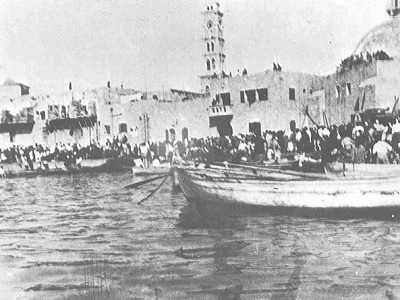Baroud in Al Jazeera: How Israel’s Violent Birth Destroyed Palestine

The exodus Of Yafa's residents in boats in May 1948. (Photo: File)
By Ramzy Baroud – Al Jazeera
As Israel celebrates the Palestinian Nakba as its triumphant independence on May 1, it is preparing for a massive celebration for the 50th anniversary of its occupation of East Jerusalem, the West Bank and Gaza.
Two dates are often used to frame the so-called Palestinian-Israeli conflict: Nakba Day on May 15 and Naksa Day on June 5.
Nakba means “catastrophe”, a reference that was commonly used to describe the violence meted out against the Palestinian Arab population during the period of British colonialism in Palestine, which extended from 1917 to 1948.
The term Nakba morphed to define the zenith of British and Zionist colonisation and settlement in Palestine, which ultimately led to the ethnic cleansing of the Palestinian population from their historic homeland in 1947 and 1948.
May 15, 1948, was the final act of all previous “catastrophes”.
Naksa, on the other hand, means the “letdown”.
In that period, there were high hopes among ordinary Arabs that Arab armies would manage to defeat Israel, reclaim historic Palestine and pave the road for the Palestinian refugees – dispossessed during the Nakba – to go back to their homes.
By then, the number of refugees had grown rapidly, and refugee camps were bursting at the seams with misery and destitution.
During the Nakba, nearly 500 villages were destroyed, entire Palestinian towns depopulated and approximately 800,000 Palestinians exiled to make room for Jewish immigrants who arrived from all corners of the globe.
The 1967 war, however, was a major letdown.
The Arabs were soundly defeated.
– Read more: How Israel’s Violent Birth Destroyed Palestine – Ramzy Baroud, Al Jazeera










































0 Comments